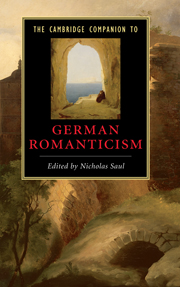Book contents
- Frontmatter
- 1 What is Romanticism, and where did it come from?
- 2 From early to late Romanticism
- 3 Prose fiction of the German Romantics
- 4 The Romantic lyric
- 5 The Romantic drama
- 6 Forms and objectives of Romantic criticism
- 7 Romanticism and Classicism
- 8 Women writers and Romanticism
- 9 The Romantics and other cultures
- 10 Love, death and Liebestod in German Romanticism
- 11 Romantic philosophy and religion
- 12 Romantic politics and society
- 13 Romantic science and psychology
- 14 German Romantic painters
- 15 Romanticism and music
- 16 Transformations of German Romanticism 1830-2000
- Key authors and their works
- Further reading
- Index
4 - The Romantic lyric
Published online by Cambridge University Press: 28 September 2010
- Frontmatter
- 1 What is Romanticism, and where did it come from?
- 2 From early to late Romanticism
- 3 Prose fiction of the German Romantics
- 4 The Romantic lyric
- 5 The Romantic drama
- 6 Forms and objectives of Romantic criticism
- 7 Romanticism and Classicism
- 8 Women writers and Romanticism
- 9 The Romantics and other cultures
- 10 Love, death and Liebestod in German Romanticism
- 11 Romantic philosophy and religion
- 12 Romantic politics and society
- 13 Romantic science and psychology
- 14 German Romantic painters
- 15 Romanticism and music
- 16 Transformations of German Romanticism 1830-2000
- Key authors and their works
- Further reading
- Index
Summary
Most of the poetry written by the German Romantics is remote from what we tend nowadays to appreciate in a poem. It lacks the concreteness, the precision, the dense texture and above all the love of the particular that we have largely come to associate with the modern lyric, and beyond that, in its reliance on a limited stock of themes and motifs (nightingales, the heart, stars, moonlight, gardens, spring, childhood, the soul ...), it seems to stand for what much modern poetry has worked against. More so than in the writings of the English Romantics its world can seem to join up with our own experience and our articulation of it only by stark contrast. At the same time, thanks in part to Schubert, Schumann, Brahms and other composers of the Lied, if we are familiar with any German Romantic work it is likely to be a poem; and to some extent modern poetry still depends on an implicit knowledge of the once-dominant forms of the Romantic lyric to point and nuance its workings. Who, though, wrote the Romantic lyric? Conventionally German literary history, because of the virtual simultaneity of Classicism and Romanticism in the German tradition, excludes several writers who from a European perspective are clearly Romantic poets, chief among them Goethe and Hölderlin. Romantic poetry in the narrow sense is as unthinkable without the example of Goethe's early poetry as is the Romantic novel without his Wilhelm Meister, though the debt was much less fully acknowledged at the time.
- Type
- Chapter
- Information
- The Cambridge Companion to German Romanticism , pp. 67 - 84Publisher: Cambridge University PressPrint publication year: 2009
- 3
- Cited by

